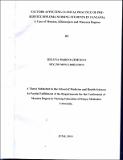| dc.description.abstract | Clinical practice is an essential part of nursing education. Nursing students must effectively complete all the required clinical placements in order to qualify for professional nursing practice. The purpose of this study was to describe the factors that affect learning during clinical practice by pre service diploma nursing students in Tanzania. The objectives of the study were to: - identify student factors affecting clinical practice of pre service diploma nursing students; identify hospital factors affecting clinical practice of pre service diploma nursing students in Tanzania and determine the effects of social economic background on the nursing student's clinical practice. The study design used was descriptive cross-sectional in which the questionnaire were used to coilect data which were pretested at Karatu Health training institute department of nursing for reliability and validity. A census approach was used to include all 85 nurse tutors as well as 123 pre service diploma nursing students. Sampling technique was purposive sampling to select three (3) administrative regions; the researcher used simple random sampling to select nursing students and nurse tutors included in the study. The sample was drawn from three administrative regions of Tanzania namely Kilimanjaro, Mwanza and Manyara with a total of eight nursing schools within 8 districts. The results showed that anxiety and gender significantly affected clinical practices with P value of 0.0020.Effective supervision and assessment of students improved clinical practice (32.3%).Less than half of nursing students (39.6%) reported lack of self-confidence while32.3% mentioned absenteeism from clinical area from time to time. About half of the nurse tutors (49.4%) reported the factors which negatively affected clinical practices including enrollment of large number of students which did not match with the number of nurse tutors. Ways to improve clinical practice included recruitment of adequate and competent number of nurse tutors reported by (51.8%). As to conclude female students as finding revealed, are the one with great deal of anxiety than male students this affected their clinical practices, nurse tutors and clinical instructors should encourage and sensitize them. Effective and fairly supervision and assessment by competent nurse tutors and clinical instructors help nursing students to gain self-confidence. Also supervisors and other staff in the clinical area who are assigned to guide students can be serious to make sure that students can attend in clinical area regularly and on time without abscondment. Resources which were missing should be taken into consideration and priority. Additionally, modern skills laboratory and competent nurse tutors were needed in each nursing schools. | en_US |

